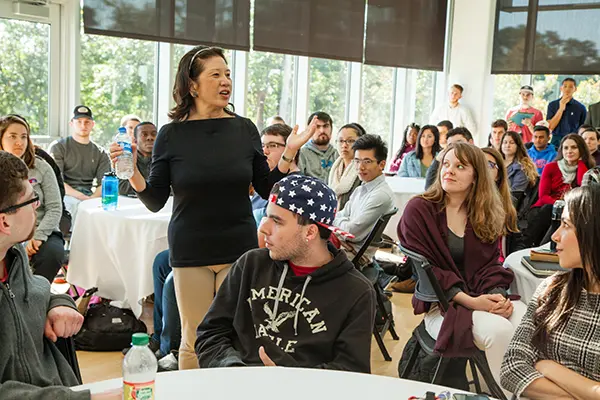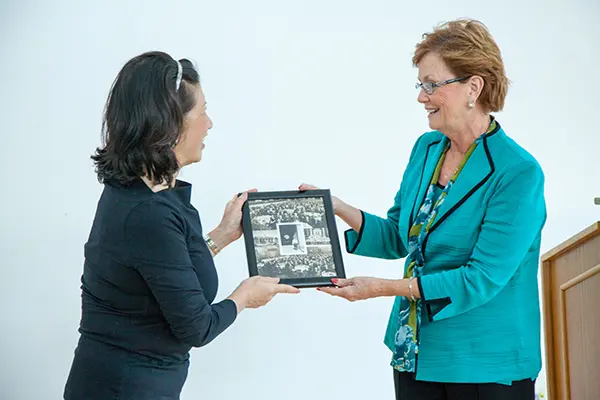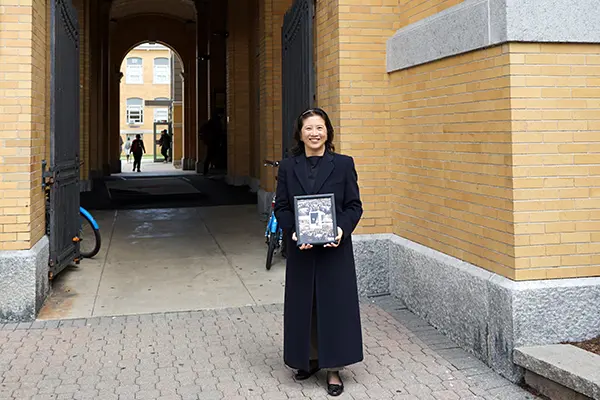Marjorie Yang, Chair of $1B Esquel Group, Retraces Father’s Lowell Textile Institute Roots
 Image by Meghan Moore
Image by Meghan Moore
10/22/2018
By Ed Brennen
Standing in front of Southwick Hall, in the very same spot where her late father, Yuan-Loong (Y.L.) Yang, was photographed 70 years earlier as a graduate student at the Lowell Textile Institute, Marjorie Yang could sense the moment coming full circle.
“This place has so much energy. I think it has the same spirit as when he came here,” Yang said while visiting her father’s alma mater for the first time. “He didn’t go to MIT – he chose to come here because this was the happening place. And I think, today, maybe we are going back to that.”
Yang didn’t follow in her father’s college footsteps (she earned a bachelor’s degree in mathematics from MIT and an MBA from Harvard Business School), but she did follow him professionally, albeit against his wishes.
Today, Yang is chair of the Esquel Group, a $1 billion global textile and apparel manufacturer started by her father in 1978. Based in Hong Kong, Esquel is the world’s largest maker of woven cotton shirts, producing nearly 100 million garments annually for brands such as Ralph Lauren, Tommy Hilfiger, Patagonia and Nike, as well as its own labels, PYE and Determinant.
 Image by Meghan Moore
Image by Meghan Moore
“My father told me early on, ‘Go get a good education so you don’t have to end up in the garment industry. I don’t wish it upon a child, especially a daughter,’” Yang told close to 150 engineering, science and business students and faculty members during her recent campus visit, which also included a tour of the Fabric Discovery Center and the North Campus Innovation District.
A regular on Forbes’ list of Asia’s 50 Power Businesswomen, Yang talked about the future of the textile industry and her company’s commitment to sustainability and social responsibility during her hourlong talk at the standing-room-only Saab ETIC Perry Atrium, where she engaged with the audience by casually walking amongst the crowd.
“She is a brilliant leader in her field, and we are so humbled and honored for her to come to UMass Lowell and connect her great accomplishments with those of her father,” said Chancellor Jacquie Moloney, who presented Yang with a framed black-and-white photo of Y.L. standing under the Southwick arch, along with a photo of the house on Bridge Street where he and Yang’s mother, Dora, lived while he earned a master of science degree in textile chemistry.
With 57,000 employees worldwide, Yang said she feels a responsibility to provide a quality work environment and wages that allow for social mobility – lessons that she learned from her father.
 Image by Meghan Moore
Image by Meghan Moore
“You don’t have to be a sweatshop to compete,” said Yang, whose company is investing in technology to improve production in China rather than moving to cheaper and less regulated factories in neighboring countries. “We don’t call it an automation line; we carefully call it an integration line. We are not trying to eliminate people. We want to enhance their productivity with automation, robotics and other forms of technology.
“And that’s why I’m so excited about the work you’re doing here at UMass Lowell, because you are exactly the kind of people who are going to make this possible,” Yang added. “I see a lot of solutions that are being developed here.”
While Yang admitted that she “can’t even measure someone for a shirt,” she does know how to “encourage young people like yourself to solve problems.”
“We need people like you who are going to be the interface between workers and the latest technology. That’s called management,” Yang said. “And then those of you who are really good, that’s called leadership. Leadership doesn’t mean you have to be the president of the university, leadership happens everywhere.”
 Image by Ed Brennen
Image by Ed Brennen
Yang then issued an impromptu challenge to the students in the room: Figure out a way to quickly cut single pieces of fabric using a laser.
“The problem is, people can’t pick up the pieces fast enough,” Yang said. “It creates a bottleneck, and you are wasting the speed you gain in cutting. So there’s a problem for you to solve. Maybe we will get some of you to come and intern with us and make that a team project.”
Kelsey Wright, a senior plastics engineering major from Lawrence, made a beeline to Yang after the presentation to thank her for her inspiring words.
“I really appreciate her talk because I like to see more women innovators and more women in powerful positions,” Wright said. “I love that UMass Lowell is branching out and getting different perspectives from women from different cultures and different avenues.”
“This is why you go to a university... It’s the opportunity to learn from someone who walks through the door that day to impart some different knowledge.” -Engineering Dean Joe Hartman
Assoc. Prof. of Marketing Ying Huang, who used to work in the textile export industry in Shanghai, said bringing an industry leader like Yang to campus shows how the university’s global reach is expanding.
“She really connected with students and inspired them to think about sustainability and being innovative, which is what we have been training them for,” Huang said. “I was inspired, as well.”
“This is why you go to a university,” added Joe Hartman, dean of the Francis College of Engineering. “It’s not always for the classes. It’s the opportunity to learn from someone who walks through the door that day to impart some different knowledge. We’re just thrilled she took time out of her day to impart a little wisdom.”
Some other topics that Yang covered included:
- The growing trade war between the U.S. and China, which Yang said she isn’t worried about since “only 41 percent” of Esquel’s market is in the U.S. But even in an economic downturn, Yang said there is always a silver lining. “Never waste a crisis,” she said, noting that when times are good, businesses are more concerned with fulfilling orders than innovating. “Crisis time is when you can challenge people, and then you have innovation.”
- The $315 million factory that Esquel is building in southwest China, a waste-free and energy-efficient facility set on 130 acres that Yang referred to as the company’s “Cameron Diaz.” Several years ago, Walmart invited Yang to take part in a panel discussion on sustainability in Shanghai. When nobody showed up to listen, Yang discovered that everyone was in the next room listening to the actress Diaz. “I learned that when you want to make a statement, you have to have a Cameron Diaz,” Yang said with a grin.
- Her success as a woman business leader and the gender-neutral culture at Esquel, which Y.L. Yang began by hiring a woman for one of its top two positions. “My father was always very supportive of women,” Yang said. “I think he was liberated here at UMass Lowell.”
- The importance of Esquel growing to a $1 billion business. Yang recalled going out to dinner years ago in New York City with a friend, who introduced her to then-businessman Donald Trump as the owner of “a billion-dollar textile company.” Esquel wasn’t yet half that size, which Yang reminded her friend after Trump walked away. “It doesn’t matter,” the friend said. “He doesn’t hear unless it’s a billion dollars.” Said Yang, “That’s when Donald Trump taught me that I must go up to at least a billion if I want to make a difference in the world.”




